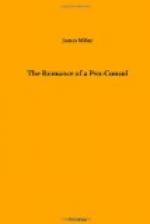‘I informed Adrian Hope,’ he described the result, ’of the apparent state of affairs in India, and of the course which seemed to me necessary. This was that he must proceed direct from Cape Town to Calcutta, instead of following his existing orders. Should there be no need for him at Calcutta, he could continue his voyage to Singapore, with a loss of time not material. Quite naturally, he was doubtful as to what he ought to do. He was under orders for a theatre of war, and was responsible to his superiors in London.
’I undertook the full authority for the change which I urged, and I remarked that unless he accepted my direction, it would most likely be refused by other officers arriving at Cape Town. He agreed to do as I wished, on condition that I put my commands in writing, and this I did at once. The noble fellow arrived in India in the nick of time, as did the forces which had previously left South Africa. Sir Colin Campbell was enabled, being so strengthened, to complete his expedition for the relief of Lucknow.
’I caused a steamer to cruise out from Cape Town, to intercept other troopships and send them on to China. While I was thus steadily forwarding relief to India, I learned that Canning, the Governor-General, was still hopeful of avoiding grave trouble. At that I was anxious lest, after all, I had misjudged the situation and the demands upon myself to meet it. Next, I had full tidings from India, and I knew that my efforts, twice over, would have been useful. India was in the balance.’
Sir George had to keep the peace in turbulent Kaffraria with a mere remnant of soldiers. The colonists, anxious to assist the relief of India, took sentry-go at Cape Town in place of the regulars. It was all a knitting of the Empire; the uniting of its strands by blood and bone and sentiment; that federation, based on race and the human qualities, which had budded and bloomed in Sir George Grey’s mind.
‘For instance,’ he wrote from Cape Town, ’there is not one of the gentlemen in this part of the country who will now, in his turn, abandon his bed, to sleep for the night in the guard-house, and to walk his beat as sentry, who will not think that he has made some sacrifice for Her Majesty’s honour and for the safety of even a distant part of the Empire, and who will not henceforth regard any persons that assail the interests of the Queen, or her possessions, very much in the light of personal antagonists. In fact, all here now feel that they are useful members of a great body corporate, in which they have their personal interest, which arises from having made some sacrifices to promote the common good of the whole. Such a feeling, pervading the Empire, must immeasurably increase its strength, unity, and stability.’
Sir George sent his own carriage horses to India, there to be yoked to smoking guns, and went afoot in Cape Town. The maintenance of peace, among the pugnacious chiefs of South Africa, depended mainly upon his personal influence with them. He borrowed horses and rode round among those chiefs, binding them over, in their only recognisances, as honourable men, not to disturb the country. It was a strange Pax Britannica; an affair of novel, almost quixotic, elements. But it went through royally.




